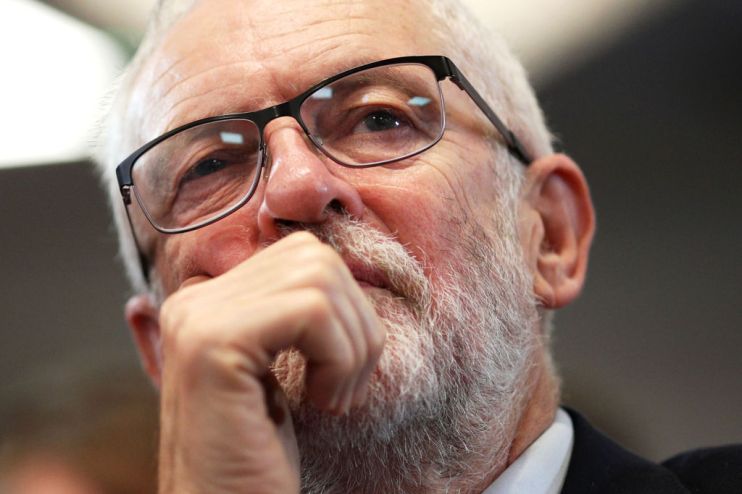Labour manifesto: Capital gains tax hike to fund £83bn spending spree

Jeremy Corbyn is planning a raid on the UK’s higher earners as part of plans to fund its commitment for nearly £83bn on day-to-day spending, the Labour manifesto revealed today.
In what Corbyn dubbed a “radical” manifesto, launched in Birmingham today, he revealed that a Labour government would change how capital is taxed, bringing it in line with income tax, as part of plans to pay for its multi-billion giveaway.
Read more: Labour’s election manifesto takes aim at banker hostility
Capital gains tax hike
Capital gains tax (CGT) is currently set at zero, 15 or 20 per cent, while income tax stands at 20 per cent, 40 per cent or 45 per cent – although that rate would also be hiked under a Corbyn government.
Primary residences will continue to be exempt from capital gains tax.
We’ll ask those who earn more than £80,000 a year to pay a little more income tax, while freezing National Insurance and income tax rates for everyone else.
We will end the unfairness that sees income from wealth taxed at lower rates than income from work
Labour also plans to reverse cuts to corporation tax – although the manifesto pledges to keep rates lower than in 2010.
According to its parallel document Funding Real Change, income tax changes would generate £5.4bn a year, corporate tax changes would produce around £30bn and capital gains tax changes would yield around £14bn.
Corbyn’s government has a few other ways to raise cash for its coffers, including ramping up efforts to prevent tax evasion and avoidance, which it estimates will return £6.2bn to the country’s piggy bank.
Here are the other major manifesto tax hike proposals:
‘Use it or lose it’ property developer tax
We will use public land to build this housing, not sell it off to the highest
bidder. Developers will face new ‘use it or lose it’ taxes on stalled housing developments. We will keep the Land Registry in public hands, and make ownership of land more transparent. We will make brownfield sites the priority for development and protect the green belt.
Stamp duty on City trading
In 2017, Labour said it wanted to put stamp duty on equity and credit derivative trades as well as corporate bonds. This time around, the party plans to go further by extending it to forex spot and derivatives trades, interest rate derivatives, and commodities spot and derivatives trades at 50 per cent of transactions costs.
A discount of one-third will apply to financial firms, because financial firms
have lower transactions cost.
This will raise £2.1bn a year, Labour estimates, although the total generated by its long-standing financial transactions tax is £8.8bn.
Private schools lose VAT exemption
Fee-paying schools will lose their VAT exemption:
We will close the tax loopholes enjoyed by elite private schools and use that money to improve the lives of all children
Tuition fees and Universal Credit to be scrapped
Tuition fees would be scrapped, as would Universal Credit – both of which have been much criticised by Labour.
Windfall tax on oil companies
A Labour government would put an £11bn windfall tax on oil and gas companies to create a “just transition fund” and help shift the UK towards a green economy without creating mass job losses.
Read more: Tories go head to head with Labour on housing
The one-off tax would be calculated according to an assessment of each firm’s past contribution to the climate crisis. The total is 10 times the £1.1bn that the Treasury expects to raise from the oil and gas sector this year.
The manifesto says about that tax will be levied
…so that the companies that knowingly damaged our climate will help cover the costs. We will provide a strategy to safeguard the people, jobs and skills that depend on the offshore oil and gas industry
And the total of Labour’s ‘other’ tax plans
These include reversing cuts to inheritance tax and the bank levy, imposing VAT on private school fees, scrapping the Married Persons Allowance, and introducing a second homes tax will generate £5.2bn, plus an extra £5bn additional tax revenue through its “fiscal multiplier”.
Read more: Most Brits are confused by Labour’s Brexit stance
Brexit
Labour’s Brexit position remains a pledge to get a new deal with the EU, which it will then put to a second referendum later next year. During a Q&A session in Birmingham, Corbyn yet again refused to say which way he would campaign or vote himself.
On freedom of movement, the manifesto says:
If we remain in the EU, freedom of movement would continue. If we leave, it will be subject to negotiations, but we recognise the social and economic benefits that free movement has brought both in terms of EU citizens here and UK citizens abroad – and we will seek to protect those rights.